- Home
- Bertram Mitford
The Triumph of Hilary Blachland
The Triumph of Hilary Blachland Read online
uced
by Nick Hodson of London, England
The Triumph of Hilary Blachland, by Bertram Mitford.
________________________________________________________________________
________________________________________________________________________THE TRIUMPH OF HILARY BLACHLAND, BY BERTRAM MITFORD.
CHAPTER ONE.
THE CAMP ON THE MATYA'MHLOPE.
"There! That is Umzilikazi's grave," said Christian Sybrandt, pointingout a towering pile of rocks some little way off, across the valley.
"Is it? Let's go and have a look at it then," was the prompt reply.But immediately upon having made it, the second speaker knew that he hadspoken like a fool, for the first gave a short laugh.
"Go over and have a look at it?" he echoed. "Why we'd all be cut tobits before we got within half a mile. It's holy ground, man; guarded,picketed by armed _majara_, rigidly watched, day and night. Youcouldn't get near it, no, not at any price."
"Well, I've a great notion to try," persisted the other, to theimaginative side of whose temperament the place of sepulture of thatremarkable savage, the remorseless, all-destroying war-leader, thefounder and consolidator of a martial nation, irresistibly appealed, noless than the mystery and peril enshrouding the undertaking did to theadventurous side. "No white man has ever seen it close, I think yousaid, Sybrandt?"
"That's so. And you won't constitute the exception, Blachland. You'llnever get there; and, if you did, you'd never get away."
"Yet it would be interesting to constitute that exception," persistedthe other. "I like doing things that nobody else has done."
"Well, even if you escaped the five hundred to one chances against you,you wouldn't have the satisfaction of talking about it--not as long asyou are in this country, at all events; for let even so much as awhisper get about that you had done such a thing, and your life wouldn'tbe worth a week's purchase."
The two men were riding over the site of the old Mahlahlanhlela Kraal--distinguishable by its great circle of nearly overgrown hut floors, andsherds of rude pottery, erewhile the head-quarters of a favouriteregiment of the Great King, whose tomb they were viewing. There itrose, that tomb, away on the right, a great pile standing boldly againstthe sky--prominent from the outermost edge of the rugged Matopo, alltumbled rocks, and granite boulders and scant tree growth; in front, anundulating sweep, bounded by the Inyoka ridge, the site of old Bulawayo.The two men were dressed in serviceable and well-worn buckskin, andcarried rifles. Following a little distance behind them came a group ofnatives, whose burden, the meat and other spoils of a young sableantelope bull, testified to the nature of the errand from which theywere returning.
The countenance of both, darkened by sun and exposure, wore the sameexpression of blended repose and latent alertness which a rovingup-country life seems invariably to produce. Sybrandt--he had droppedthe original "Van"--was Dutch by birth, though English by sympathies andassociations. Trader, hunter, gold-prospector, adventurer all round,his life had been spent mainly on the confines of civilisation, or farbeyond the same; and what he did not know about natives, from theZambesi to Durban, from Inhambane to Walfisch Bay, nobody else did. He,for his part, was no less known to them. "U' Klistiaan," as they calledhim, in adaptation of his baptismal name, stood to them as a white manwho commanded their respect and confidence far and wide. Of coolcourage and unflinching resolution, a firm friend, and, while enmitylasted, a determined and dangerous foe, he stood as high in theestimation of the Zulu-speaking races as these qualifications couldplace him, which is to say at the highest. He was a man of about forty;in outward aspect of medium height and of sturdy and powerful build, hisdark hair and pointed beard just turning iron grey. His companion, whomwe heard him address by the name of Blachland, was something of amystery. Nobody knew much, if anything, about him, except thatoriginally he was an English importation with some years of up-countryexperience, and that he came and went sporadically, disappearing for atime, and turning up again as if he had been away about a week,perfectly unexplanatory, uncommunicative, as to his doings in theinterim. He was a tall dark man, who might be any age compatible with ahardy frame and untiring energy. A keen sportsman and keeneradventurer, he was ever on the look out for the possibilities underlyingup-country life; and, in curious contrast to his normally hard andphilosophic nature, was a tendency to fits of almost boyish excitementand recklessness; which would break out when least expected, and withapparently inadequate motive, and which were wont to land their owner inpositions of peril or difficulty, but which, by a curious compensatingelement in nature, were none the less available to extricate himtherefrom right at the critical moment.
Now he made no reply to his companion's very confident and more thanominous forecast. But more than one wistful glance did he send in thedirection of the great natural mausoleum. The King's grave! This rocksepulchre would hold all that was weird and uncommon, and into it noEuropean eye had ever gazed. That was sufficient for one of HilaryBlachland's temperament.
Soon the last resting-place of Umzilikazi, the Great King, was hiddenfrom sight behind. A few miles more and a strange phenomenon as of amighty cloud of dust and smoke, crowning a distant eminence, broke uponthe view in front, and through it a vast cluster of round grass roofs,from the silent throne of the dead the pair had turned to front thethrone of the living, pulsating with humanity and its primitiveimpulses--Bulawayo, the great kraal of Lo Bengula, son of thatUmzilikazi whose bones lay within the sombre heart of that great rockpile behind.
Not on this, however, were their steps bent. Down in the valley a campwas set, and the white tents of three waggons rose among the scant bushon the banks of the Matya'mhlope, at the foot of the abrupt ridge ofshining stones which gives to that insignificant river its name. And asour two wayfarers gained it the sun dropped, and in this latitudewithout twilight the night began to fall.
Two other white men were seated in camp as these two arrived. LikeChristian Sybrandt, Young and Pemberton were traders and hunters, andlooked it; whereas the presence of Hilary Blachland with the outfit wasinconsequent. But that word more than rather summed up HilaryBlachland. He was all keenness, however, on anything new and strange,and now the impression had grown and grown upon him that Umzilikazi'sgrave came under both these qualifying adjectives.
Wherefore later, when the fire was roaring up brightly with red andcheery glow, and the sable antelope steaks, hot and fizzing, had beentransferred from the frying-pan to the metal enamelled camp plates, hemust needs drag in the subject again.
Pemberton, the elder of the other two traders, whistled and shook hisheavy beard.
"It's a thing that won't bear meddling with," was his laconic dictum.
"Well, I should like to meddle with it to the extent of having a look atit anyway," persisted Blachland. "Any one here ever seen it close, bythe way?"
"No, nor likely to," answered Young. "I saw it once, about a mile off;near enough to get a good look at it through a glass. It's a tallcleft, running right up the face of the boulder, and overhung by anotherboulder like a porch. There's a tree in front too. I'd just time tosee so much when a lot of _majara_, spotting my binoculars, started forme, yelling like blazes. I judged it wise to take a bee-line forBulawayo, and get under old Lo Ben's wing; but they ran me hard all theway--got there nearly as soon as I did, and clamoured to be allowed tokill me. Lo Ben wouldn't have that, but he hinted to me quietly thatthe country wouldn't be healthy for a year or so, and I took the hint.No, take my advice and leave it alone. Apart from the risk, there's noluck meddling with such places--no, none."
"Oh, skittles about luck. It's the risk I take count of, and that only.The fact is, Young, you old up-country men are as superstitious assailors," returned Blachland, with that strange, eager restlessnesswhich now and then, and generally unexpectedly, obtruded to give the lieto his ordinarily calm and immobile demeanour. "I'll risk the_majara_--luck doesn't count,--and sooner or later I'll exploreUmzilikazi's grave."
Sybrandt was conscious of what, in a less self-contained man, would havebeen an obvious start at these words. A dark form had glided silentlyin among them all. It was only one of their camp servants, but--anative of the country. What if he had heard--had understood? He knewsome English too!
"Even if you got through the pickets of _majara_, Blachland," struck inSybrandt, when this man had retired; "you'd have another factor toreckon with. The King's Snake."
"Eh?"
"The King's Snake."
Blachland spluttered. "See here, Sybrandt," he said. "Are youseriously trying to fill me up? Me, mind? No, it can't be."
"Well, the Matabele say there's a big snake mounting guard overUmzilikazi's remains. It is the King's spirit which has passed into thesnake. That is why the snake comes in such a lot when they goperiodically and give the _sibonga_ at his grave."
"And you believe that?"
"They say so."
"What sort of a snake is it?"
"A black _imamba_. Mind you, I've never seen it."
"Don't you be so cocksure about everything, Blachland," gruntedPemberton, who was fast dropping asleep. "Luck or no luck, there'smighty rum things happen you can't explain, nor scare up any sort ofreason for."
"Won't do--no, not for half a minute," returned the other, briskly anddecisively. "You can explain everything; and as for luck, and all thatsort of thing--why, it's only fit for old women, and the lower orders."
Pemberton grunted again, and more sleepily still. His pipe at thatmoment fell out of his mouth, and he lurched over, fast asleep.Sybrandt, too, was nodding, but through his drowsiness he noticed thatthe native, a low-class Matabele, Hlangulu by name, was moving about, asthough trying to sidle up near enough to catch some of the conversation.He was drowsy, however, and soon dropped off.
Blachland, sitting there, felt anything but inclined for sleep. Thisnew idea had caught on to his mind with a powerful hold. It was full ofrisk, and the object to be attained _nil_. The snake story he dismissedas sheer savage legend, childish and poor even as such. The lucktheory, propounded by Pemberton, smacked of the turnip-fed lore of theaverage chaw-bacon in rural England. No, the risk lay in thepicket-guard. That, to his mind, constituted the real peril, and theonly one. It, however, might be avoided; and, the more he thought aboutit, the more resolved was Hilary Blachland to penetrate the forbiddenrecess, to explore the tomb of the warrior King, and that at any risk.
Strangely wakeful, he lounged there, filling and lighting pipe afterpipe of good Magaliesberg. The stars gleamed forth from the dark vault,so bright and clear and lamp-like in the glow of night in those high,subtropical latitudes, that it seemed as though the hand had but to bestretched forth to grasp them. Away over the veldt, jackals yelped; andthe glimmer of the camp fire, dying low, emboldened the hungry littlebeasts to come nearer and nearer, attracted by the fresh meat brought induring that afternoon. The native followers, their heads in theirblankets, had ceased their sonorous hum of gossip, and were minglingtheir snores with the somewhat discomforting sounds emitted by thenostrils of Pemberton. Away on the northern sky-line, a faint glowstill hung, and from time to time a muffled snatch of far-away song. Adance of some sort was in late progress at the King's kraal, but suchhad no novelty for Blachland. The exploration of the King's grave,however, had; and he could think upon nothing else. Yet, could he haveforeseen, his companions had uttered words of sound wisdom. He hadbetter have left Umzilikazi's sepulchre severely alone.

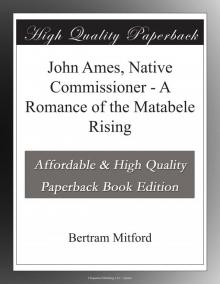 John Ames, Native Commissioner: A Romance of the Matabele Rising
John Ames, Native Commissioner: A Romance of the Matabele Rising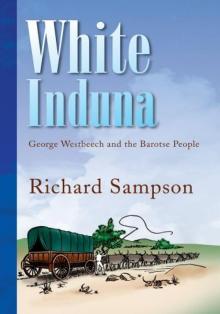 The Induna's Wife
The Induna's Wife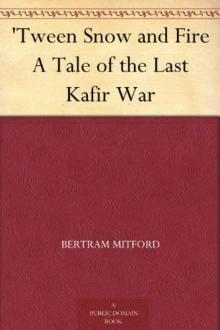 'Tween Snow and Fire: A Tale of the Last Kafir War
'Tween Snow and Fire: A Tale of the Last Kafir War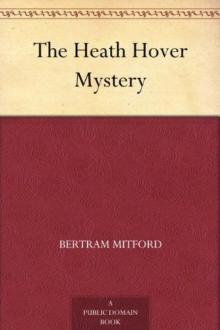 The Heath Hover Mystery
The Heath Hover Mystery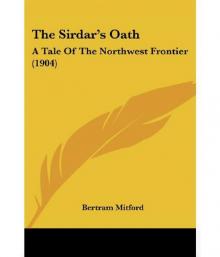 The Sirdar's Oath: A Tale of the North-West Frontier
The Sirdar's Oath: A Tale of the North-West Frontier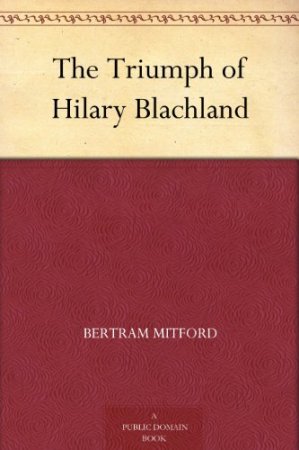 The Triumph of Hilary Blachland
The Triumph of Hilary Blachland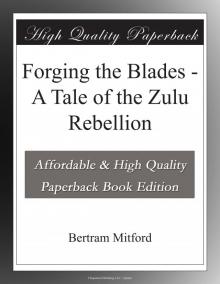 Forging the Blades: A Tale of the Zulu Rebellion
Forging the Blades: A Tale of the Zulu Rebellion The Red Derelict
The Red Derelict The Ruby Sword: A Romance of Baluchistan
The Ruby Sword: A Romance of Baluchistan The Fire Trumpet: A Romance of the Cape Frontier
The Fire Trumpet: A Romance of the Cape Frontier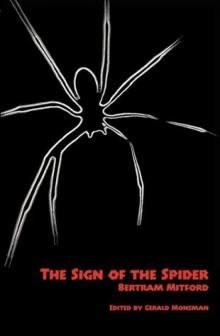 The Sign of the Spider
The Sign of the Spider